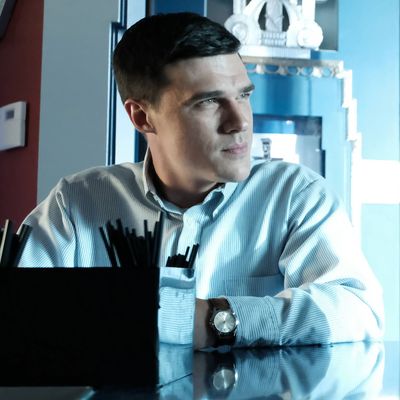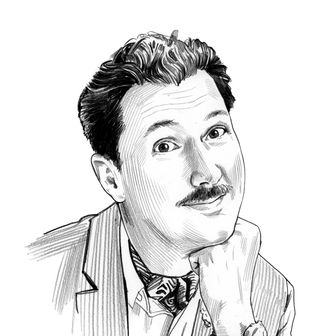
Oh, thank God. Gianni Versace is back, he wears an amazing Versace top while being interviewed by The Advocate, and, as a special bonus, we also get Penelope Cruz as Donatella Versace wearing a fitted butterfly blazer and microscopic black skirt. What better outfit to wear when being super mean to your brother and his lover? I would probably let someone treat me as shabbily as Donatella does Antonio as long as she dressed like that.
Those few scenes add splendor to the otherwise dreary and sad world of Andrew Cunanan, where we’ve been living for the past few episodes. “Don’t Ask Don’t Tell” is really about coming out and the two very different experiences of these two very different men. We see Gianni in his great designs and well-lit photo shoot for his Advocate cover, immediately contrasted with Jeff Trail, one of Cunanan’s victims, giving an interview with CBS News about gays in the military where he has his face and voice disguised “like a criminal.”
This illustrates just how difficult and different coming out was for different classes of people in the mid-‘90s. Versace, as a millionaire with a thriving business in a creative field, was allowed to come out without much consequence. (Although the actual Advocate interview wasn’t exactly as depicted here.) Donatella is worried that celebrities and tastemakers will leave the brand like they did to Perry Ellis when it was discovered that he was dying of AIDS. Her brother retorts, “At least we’ll keep Elton,” meaning the famously out rocker Elton John. (Duh.)
Versace’s coming out is seen as a celebration, something that advances gay rights and gay visibility. It was only possible because he was in fashion, one of the industries where you can’t swing a designer handbag without hitting a friend of Dorothy’s. Not everyone was so lucky to have the financial success and protection that Versace did, and things were a lot harder for them.
Look at how it was for Jeff Trail. He’s forced into the closet so that he can continue to serve his country and be a member of the military. Everyone in his family has served. While coming out might have a bit of an impact on Versace’s multimillion-dollar business, if Trail came out, he’ll lose his job, possibly his family, and everything he holds dear. Coming out isn’t a choice for him, especially after his commanding officer gives him a creepy comic book (seriously, U.S. military? A comic book?) about how he can’t be gay and in the Navy at the same time.
I always say that the closet makes people crazy, and in this case, it leads Jeff to consider severe self-harm. He thinks about cutting out a tattoo on his leg when he hears that a gay man has been caught for cruising on his military base and is going to rat out the tattoos of every enlisted man he’s slept with. First of all, this is a bad idea because it doesn’t work (except as a plot device on Riverdale). Second of all, it’s a bad idea because who the hell wants to carve out their flesh in the shower with a box cutter and some alcohol?
After the comic-book incident, Jeff tries to hang himself in the shower rather than come out, but he can’t do it. He’s suffering under “Don’t Ask, Don’t Tell” not only in the military, but also in his own mind. Maybe if he doesn’t talk about it, he seems to decide, he can be just a little bit gay. Even after he’s out of the military, he refuses to come out to his parents despite his sister insisting that he do it. He knows that she has his back, so why can’t he still be true to himself? After being in the military for so many years, the homophobia is coming from inside the house.
I didn’t really like the way the episode played out, however. We see Jeff first through Andrew’s eyes, when he plots a trip to Minneapolis (on American Express’s dime) in a last attempt at having a normal life by marrying David. Thanks to the last episode, we all know how that ends. I’m still fascinated with the series playing out backwards because Andrew’s trip always had an air of failure about it, from the moment he shows up at the airport to a less-than-fuzzy reception from his former friends. Because of what we’ve seen, there is a much more sinister overtone to the proceedings.
What I didn’t like is that we see Jeff talking on tape about saving a man’s life in the military and how he wouldn’t do it again because that is what outed him to his fellow sailors. I feel like that really took away from the magic of seeing him actually save the man, comfort him in the showers, and get caught by that very imposing looking dude with a mustache. (How come the old-school bigots in these things always have a mustache?) If we didn’t know what was coming, it would have had more impact. The same goes for when he finally gives the interview later in the episode. It just seemed like needless repetition. The emotion could have been more intense if we didn’t see Andrew watching that video in the first place and didn’t know exactly what Jeff was going to say.
The relationship between Andrew and Jeff is also very confusing. Andrew definitely saved Jeff the first time he came into a gay bar: He needed someone to show him the ropes, prove to him that being gay wasn’t so awful, and to joke about his name being spelled out in sparklers on the bar. But eventually, Jeff is the only one who sees that Andrew is just spinning a bunch of lies, and that he’s a dangerous sociopath who could cause them all a lot of pain. David, on the other hand, sees Andrew as harmless and wants to help him. He even offers to break his date with the hunk in the leather vest so they can talk, but Andrew can’t abandon his “crazy stories” about starting a new life in San Francisco in order to ask for help. When he does accept David’s offer, it’s only as a pretense so that he can kill both David and Jeff. The crazy stories are stronger than any real connection with a human being.
What confused me was when Andrew and Jeff have their confrontation in Jeff’s sad apartment when he returns home to find Andrew eating Fruit Loops on the floor and his military uniform splayed out on the bed. He confronts Andrew about the story and about sending a postcard to his parents trying to out him. Even though Andrew saved him, Jeff wishes they never met. “The bars, the meals, the men. Everything you gave me means nothing,” he tells Andrew. “I want my life back. My real life, as a soldier.” Jeff equates gay life with Andrew and since Andrew is a person of mirages masking an empty and rotten core, he sees gay life the same way. We would assume that because Andrew was his role model, Jeff thinks it is impossible to live a rewarding and openly gay life. He sees gay values as being about fun times, meaningless sex, designer clothes, and hot go-go boys in star-spangled Speedos. That’s why he rejects both Andrew and gay life and ends up yelling at other veterans in the lunchroom of a shitty factory.
I could buy that, except that Jeff also has David in his life. We get hints that they’re a couple — even though David was obviously seeing other people — so why wouldn’t David be a good role model for Jeff? He’s openly gay, he has a successful career, and he’s a caring person who seems to be about more than just hookups in the back of bars. Shouldn’t Jeff see that he can have a life like David’s? Shouldn’t he know that Andrew is the negative extreme played up by the media and shitty military comic books?
Tragically, he doesn’t. Finn Wittrock does an excellent job showing Jeff’s pain and struggle, just as Darren Criss and Cody Fern have both been spectacular in the past two episodes. It’s going to be a really tough Emmy race if they wind up duking it out with each other. This episode as a whole, however, seems a little bit clunky. It’s just too much of a stretch to knit all of these stories together in a meaningful and emotionally impactful way. Still, the differences between these coming-out stories are key to understanding exactly how and why Versace’s death happened, and I’m glad the show is drawing those unique parallels.


